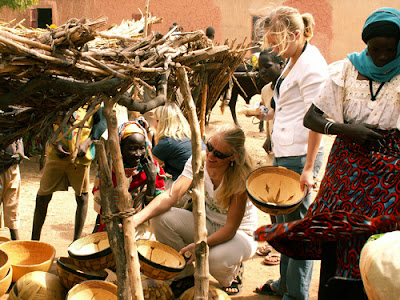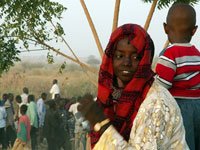 In January 2006, Svein-Erik & Liv Vrålstad (my father's cousin and his wife) came to us in Niger for a two week long visit. Although many people find Niger boring and underdeveloped, the Vrålstads fell in love with Niger and really thrived. Liv especially was hooked and when she came home, she struggled for a while to find a way of sharing her discoveries with people in her midst.
In January 2006, Svein-Erik & Liv Vrålstad (my father's cousin and his wife) came to us in Niger for a two week long visit. Although many people find Niger boring and underdeveloped, the Vrålstads fell in love with Niger and really thrived. Liv especially was hooked and when she came home, she struggled for a while to find a way of sharing her discoveries with people in her midst.An interior architect who has been working with children for the past few years, she recently set up her own business, Livswerk, which specializes in selling handmade leather craft from Niger. She sent me the link to her website a few days ago and I just knew I had to share.
It's currently only in Swedish, but you can click around and have a look at the handmade leather mats that come in different shapes and different colors. When Liv was in Niger, she felt like she was on a constant treasure hunt - and I'm not surprised, because Africa has so many riches! You just have to find them. The Nigerien leather works is a really old tradition and they do a very good job. You just have to be a little creative and go treasure hunting! One example is a simple leather bag I found, which I fell in love with and bought. At first I thought I would give it to a friend in Europe but it was so nice that I just started using it myself. Yaronbaba (my jockey) saw it and was amazed, asking me if that nice piece of work had really been done in Niger??? I said yes, and he then told me I had to give it away to Sofia, my second cousin who came out for a seven week long visit and made a name for herself with her ready smile and good humor.
 Sorry to say, the bag was there to stay (I'm sure Sofia forgives me!), but the point is; Niger is a great place to go treasure hunting. Unfortunately, we can't all pay €1000 just to go discovering, but Livswerk is a great place to get started. Don't forget to let Liv know if you would like anything custom made. The "leather-men" in Zinder will be thrilled!
Sorry to say, the bag was there to stay (I'm sure Sofia forgives me!), but the point is; Niger is a great place to go treasure hunting. Unfortunately, we can't all pay €1000 just to go discovering, but Livswerk is a great place to get started. Don't forget to let Liv know if you would like anything custom made. The "leather-men" in Zinder will be thrilled! Greetings,
Greetings,Ishtar

























































































.jpg)

.jpg)

































